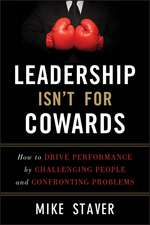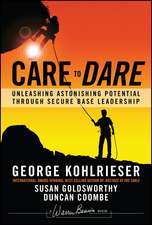Building Leadership in Project and Network Management: A Facilitator's Tool Set
Autor Hans-Werner Franz Contribuţii de D. Andrea Autor Ruggiera Sarcina Contribuţii de R. Gabrielen Limba Engleză Paperback – 23 aug 2016
| Toate formatele și edițiile | Preț | Express |
|---|---|---|
| Paperback (1) | 491.98 lei 6-8 săpt. | |
| Springer Berlin, Heidelberg – 23 aug 2016 | 491.98 lei 6-8 săpt. | |
| Hardback (1) | 449.54 lei 38-44 zile | |
| Springer – 21 iul 2009 | 449.54 lei 38-44 zile |
Preț: 491.98 lei
Nou
Puncte Express: 738
Preț estimativ în valută:
94.15€ • 98.99$ • 77.79£
94.15€ • 98.99$ • 77.79£
Carte tipărită la comandă
Livrare economică 16-30 aprilie
Preluare comenzi: 021 569.72.76
Specificații
ISBN-13: 9783662519080
ISBN-10: 3662519089
Pagini: 284
Ilustrații: VIII, 284 p.
Dimensiuni: 178 x 254 mm
Greutate: 0.52 kg
Ediția:Softcover reprint of the original 1st ed. 2009
Editura: Springer Berlin, Heidelberg
Colecția Springer
Locul publicării:Berlin, Heidelberg, Germany
ISBN-10: 3662519089
Pagini: 284
Ilustrații: VIII, 284 p.
Dimensiuni: 178 x 254 mm
Greutate: 0.52 kg
Ediția:Softcover reprint of the original 1st ed. 2009
Editura: Springer Berlin, Heidelberg
Colecția Springer
Locul publicării:Berlin, Heidelberg, Germany
Cuprins
Messages for facilitators and lateral leaders.- The functions and roles of network facilitators.- Moderation as a role.- Visualisation — why and how it helps you to understand and remember.- Basic concepts of perception and communication.- Basic concepts of learning and competence.- The concept of responsibility.- Basic concepts of organisation and co-operation.- Basic concepts of management and leadership.- Communities of practice and self-organisation.- Basic concepts of knowledge and knowledge management.- Project work as a work style.- The nature of quality: continuous improvement, continuous learning.- Basic concepts of small and medium sized enterprises (SMEs).- Basic concepts of networks and clusters.- Learning networks - constructing social capital.- Reminder – Konrad Lorenz dixit.- Didactics and curriculum.- Making learning easy – facilitation and the didactics of action learning.- A curriculum of action learning - the modules.- Tools.- Improving Communication.- Collecting information.- Planning and managing projects.- Analysing problems and preparing decision making.- Growing experience — from unconscious incompetence to unconscious competence.- The SME ACTor project experience.- e-Facilitating networking in distance co-operation contexts.
Textul de pe ultima copertă
This book builds a bridge between facilitation techniques and leadership in project and network management. It provides methodical Messages, a Facilitator Curriculum, and the wealth of 40 carefully selected and reality-proof Tools, many of which have not been published at all or at least never been published in English. The reader will benefit as much from learning by doing as from doing by learning; this book is for managers who in some way are responsible for successful co-operation in projects in and across organisations or networks of organisations, and who want to know and share better what they are going to do and to do better what they have planned to do together. It is a practical book, although it is based on scientific principles, and it draws on the authors` experience in consultancy and management.
All ready-for-use tools can be downloaded from the book´s page at www.springer.com/978-3-540-93955-9
.
Hans-Werner Franz is a senior researcher and consultant as well as a member of the Management Board at the Social Research Centre (Sozialforschungsstelle) at Dortmund University of Technology, Germany. His well established track record includes total quality management, organisation development, and vocational training.
Ruggiera Sarcina is a senior researcher and consultant, collaborating with the Italian Chambers of Commerce in Italy and abroad. Her focus is on projects dealing with local development policies, cluster development, and innovation and internationalisation of small and medium-sized enterprises.
All ready-for-use tools can be downloaded from the book´s page at www.springer.com/978-3-540-93955-9
.
Hans-Werner Franz is a senior researcher and consultant as well as a member of the Management Board at the Social Research Centre (Sozialforschungsstelle) at Dortmund University of Technology, Germany. His well established track record includes total quality management, organisation development, and vocational training.
Ruggiera Sarcina is a senior researcher and consultant, collaborating with the Italian Chambers of Commerce in Italy and abroad. Her focus is on projects dealing with local development policies, cluster development, and innovation and internationalisation of small and medium-sized enterprises.
Caracteristici
Coherent approach how to use network and facilitating techniques Guide to successfully implement leadership in project/network management Rich set of tools and methods make the book valuable across disciplines Includes supplementary material: sn.pub/extras
Descriere
Descriere de la o altă ediție sau format:
1 1. 1 The book The book in your hand is not a scientific book, although it is based just as much on science as on my own experience in consultancy and management. As its title suggests, we want to build a bridge between the leadership that is typical of facilitation techniques and that of pr- ect and network management. Therefore this book does more than p- vide you with insights into the mainly methodical Messages we want to transmit. It will also make suggestions for how to train facilitators, and in the centre of the book you will find a wealth of 40 carefully selected and reality-proof Tools, many of which have never been pre- ously published in English, and in some case have never been published at all. With all of these you will find a presentation of our way of using them. Our sole objective is to offer our views and experience in impr- ing communication for effective co-operation, i. e. we want people who collaborate in some way to find and decide on the best courses of action, then share and implement these decisions better. We want to promote learning by doing, just as well as doing by learning. So this book is for people who in some way are responsible for s- cessful co-operation in projects, in and across organisations or networks of organisations. Action Learning has many fathers (but few mothers) and roots.
1 1. 1 The book The book in your hand is not a scientific book, although it is based just as much on science as on my own experience in consultancy and management. As its title suggests, we want to build a bridge between the leadership that is typical of facilitation techniques and that of pr- ect and network management. Therefore this book does more than p- vide you with insights into the mainly methodical Messages we want to transmit. It will also make suggestions for how to train facilitators, and in the centre of the book you will find a wealth of 40 carefully selected and reality-proof Tools, many of which have never been pre- ously published in English, and in some case have never been published at all. With all of these you will find a presentation of our way of using them. Our sole objective is to offer our views and experience in impr- ing communication for effective co-operation, i. e. we want people who collaborate in some way to find and decide on the best courses of action, then share and implement these decisions better. We want to promote learning by doing, just as well as doing by learning. So this book is for people who in some way are responsible for s- cessful co-operation in projects, in and across organisations or networks of organisations. Action Learning has many fathers (but few mothers) and roots.












